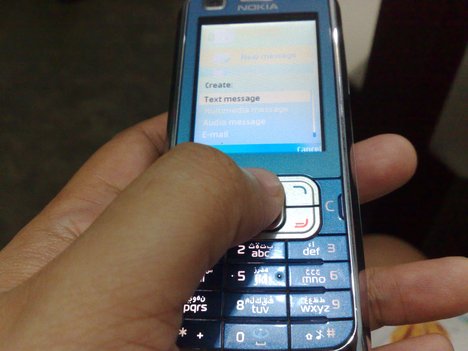Cn U Hlp Me? I Hve A ??
A Peace Corps Volunteer harnesses the power of text messaging for good health
Written by by Shannon Cummings
In a few short years, messaging (also called “SMS” for Short Message Service), has seemingly replaced phone conversations, letter writing and the traditional two cans attached by a long string as the primary form of communication for young people worldwide. Imagine if young texters in the developing world could get quick and accurate answers to their most personal sexual health questions anonymously, by simply sending an SMS. In Namibia, Peace Corps Volunteer Rashid Khan has developed a program that does just that. Khan is harnessing the global texting trend to fight rampant sexual health misinformation that contributes to a towering HIV infection rate and many unwanted pregnancies.
When Khan arrived in country, he immediately became aware of the lack of knowledge and resources Namibian youth had regarding sexual health. “After talking to local youth, both formally and informally, it became very clear that there exist serious misconceptions about pregnancy, sex, circumcision and other important topics,” explained Khan. And he was right—in his region “lack of knowledge” was listed among the top factors driving the HIV infection rate by the 2008 National HIV Sentinel survey. As a whole, the country of Namibia has an 18% HIV infection rate.
After discussing possible ways to address this problem, Khan learned of an automated, menu-based health information system started by two volunteers in the Philippines. This program allows consumers to access an abundance of pre-written health information through text messages. Khan recognized the potential to implement a similar system in Namibia, where cellular phone service is widespread and text messaging in the cheapest and most frequently used way to communicate. Together with Jennifer Moore, a fellow Namibian PC Volunteer, he developed the Health Education Response System (HER) in February of 2009.
Optimistic, but not content, Khan realized that “a fully automated system could only address the most basic of questions.” Searching for a more complete solution, he stumbled upon a North Carolina-based text line designed to answer sexual health questions from teenagers called the “Birds and the Bees Text Line.” Realizing that the demand in Namibia was present for such a service, Khan designed software so that by sending a question via SMS, consumers receive a tailored answer from a trained health Volunteer that is both accurate and timely. Additionally, the program was expanded to deliver SMS in a round robin fashion to a pool of 10 Volunteers across the country. Consumers can still view the pre-written content by texting MENU, and then following the directional guide through a menu of choices. A directory of anti-retroviral (ARV) clinics with complete contact information can be accessed by texting “ARV TownName”.
In Namibia, HER has proved transformative. The system’s popularity was evidenced in June of 2009 when nearly 2400 SMSs were processed to and from 325 unique clients. One key feature of the system is the anonymity of the questioner.
“Our goal was to answer the questions people couldn’t ask anyone else—to be a reputable, anonymous source of information,” said Khan.
By filtering all SMSs through a central server so that both Volunteers and consumers are shielded from each other’s phone numbers, anonymity is preserved. This lends itself to frank and open questions that the asker may deem too private, embarrassing or demeaning to ask without the veil of anonymity.
Another powerful attribute of HER is its connection “to a complex monitoring and evaluation system that automatically tracks, compares and reports themes of conversations.” Without identifying the data source, the records can be used as a database to inform other health-related projects of frequently asked questions and common misconceptions. The hope is that this wealth of information will contribute to a more informed and effective fight against the spread of disease bred by ignorance.
On top of all of this, the program has been meticulously designed with sustainability in mind. “Sustainability and replication were goals from the beginning. I designed the software to be installable and maintainable by anyone with minimal training,” Khan said. Not only have Khan and his group been able to secure free service from MTC, Namibia’s largest mobile network, they have also partnered with Lifeline/Childline which provides counseling to clients in need. Lifeline/Childline is in talks to take over the program when Khan completes his service and leaves Namibia.
In June 2009 alone, the HER program system exchanged 2,382 SMSs with 325 unique clients.
Khan’s success implementing HER serves as a model to others motivated to make a difference in their corner of the world. When asked for the advice he would offer someone with an idea to improve his or her community, Khan remarked:
“Dive right in today. Take inspiration and help wherever you find it.”
For more information see the PeaceCorps Press Release on the project here






































